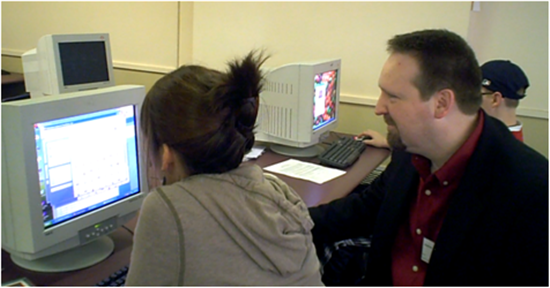As one of the many collaborations we're working on with the Kodu team, they featured me in their Community Spotlight.
Click here to read my interview with the Kodu team
I feature some of my answers here: What sort of lessons can students learn in Small Basic? (Kodu Community Spotlight: Part 1)
Here is part two, with some more of the questions they asked me...
We love success stories! Would you share with us your favorite success story surrounding Small Basic?
In my passion to see more girls educated in software engineering, here is one of my favorite stories... A key community member and Small Basic Forum Moderator, LitDev, has 2 daughters (in Scotland) who he taught Small Basic to, at age 8. He said, "They use [Small Basic] mainly to create little graphical programs, lots of bright colors. The first extension I wrote was for them that speaks text - [and they created their own programs that] mostly insult each other! Here are examples: GQL381 (look for the hidden message) and FVV083 (must run locally; uses LitDev extension) of the kind of thing they wrote."
So there you go. Small Basic is useful for insulting your siblings. Oh, and education! That too.
(Feel free to check out the Small Basic Student Testimonials for more great stories.)
| Phil Conrad (Small Basic Partner) on location, teaching Small Basic. |  |
What sort of options are available for teachers who may want to give students the additional challenge Small Basic can offer?
Check out Get Started with Small Basic. We have the free Getting Started Guide and the Small Basic Curriculum (which includes written materials and professionally made PowerPoint decks for teaching in a classroom, and low-cost books and camps from our various partners). We hope to update that page with more curriculum strategies and options as we continue to pursue integrating Small Basic into education.
Also, see
In your opinion, what specific elements of Kodu help prepare students for Small Basic?
Kodu can help you get excited about what's ultimately possible in the world of development. You’ll also build a foundation of key programming concepts like conditions and variables. Small Basic provides the next logical step after you get a taste of what's ultimately possible.
Small Basic is unique because it introduces code as a first class concept, which is how you'll eventually have to approach computer science. Kodu is something you can always come back to in order to easily create fun worlds and 3D environments.
Do you have any general advice for someone who might want to transition from Kodu into Small Basic?
The biggest step is the first step. Try to devote a minute a day to checking out Small Basic. Install it and explore what's possible. Before long, you'll be in the software or game industry creating our next generations of technology.
Thanks to the Kodu team for the interview!
- Ninja Ed